EU's Mora Holds Talks In Tehran But Little Information Available
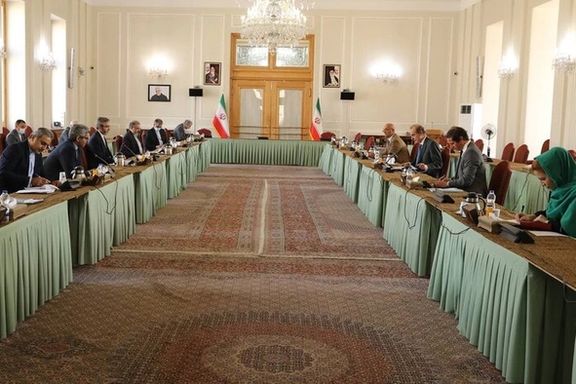
Enrique Mora, European Union’s lead negotiator on Iran’s nuclear issue met with Ali Bagheri, political deputy of Iran’s foreign ministry in Tehran, on Thursday.

Enrique Mora, European Union’s lead negotiator on Iran’s nuclear issue met with Ali Bagheri, political deputy of Iran’s foreign ministry in Tehran, on Thursday.
Mora’s trip announced earlier this week is meant to break a deadlock in the Vienna nuclear negotiation between Iran and world power that was suspended by Tehran in June. Despite calls by Western powers for the resumption of the talks, Iran has not committed to a clear date for returning to Vienna.
Iranian media reported that the two sides discussed “bilateral and regional issues”, including Afghanistan and the lifting of "cruel sanctions" imposed by the United States after former president Donald Trump withdrew from the 2015 nuclear agreement.
There is no news yet if there was an agreement over resuming the nuclear talks.
On Wednesday, US Secretary of State Antony Blinken and his British, French and German counterparts made statements that Mora’s trip is critical, and Iran must return to the talks. Blinken reiterated that the United States has to consider “other options” if Iran refuses to return to the nuclear agreement (JCPOA) and continues to advance its nuclear program.
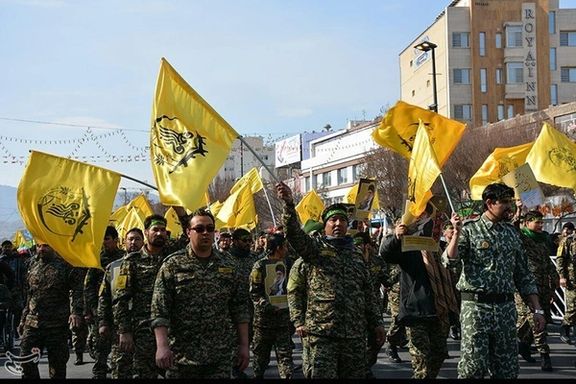
Iran-backed forces in Syria said on Thursday they would respond forcefully to an Israeli strike on Wednesday evening in the second such strike within a week.
The Syrian defense ministry said in a statement that one soldier was killed in the attack that took place at 11:34 p.m. (2034 GMT) and targeted a communications tower and caused some material losses near Palmyra.
Israel has kept silent about the strikes that came days after another attack in the Homs countryside, wounded six Syrian soldiers.
Israel since 2017 has been mounting attacks on what it has described as Iranian-linked targets in Syria, where Tehran-backed forces including Lebanon's Hezbollah have put down a presence since deploying to help President Bashar al-Assad in the Syrian conflict that erupted in 2011.
A statement by the so-called operations room of Assad's Iran-backed allies said the response to the strike would be "very cruel", adding casualties would have been much higher had its forces not been well spread across the desert area.
"As a result of this attack a number of martyrs and injured from our Mujahedeen brothers have fallen," the statement said without elaborating.
"We have taken a decision to respond to this attack in revenge for the martyrs and the blood of the injured and the response will be very cruel," said the statement.
A senior military source who requested anonymity said the strikes hit among other targets the T4 air base where Iran-backed militias launched drone strikes in recent months against US bases in northern Syria.
The Palmyra area where the strikes were conducted are close to a major concentration of Russian bases and where its troops conducted in recent days maneuvers with Syrian troops, military experts say.
Israel wants Iranian and Iran-backed forces kept away from its border and more broadly, removed from Syria entirely.
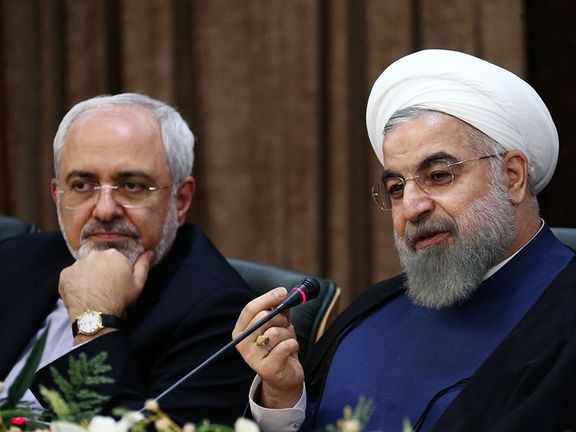
Iran's hardliners appear to be zeroing in on former President Hassan Rouhani and his officials in a bid to blame them for the country's long-standing problems.
Former foreign Minister Mohammad Javad Zarif and Rouhani’s Communication and ICT Minister Mohammad Javad Azari Jahromi are also targets for hardliners who want to find scapegoats for the country's economic, foreign policy and social problems.
The attempt to put Rouhani and his ministers on trial, as the Majles has been calling it, could also be a cover to divert attention from Supreme Leader Ali Khamenei who is the man making nearly all decisions relating to the affairs of the state without assuming responsibility when his policies go wrong.
Iran has faced various degrees of isolation during Khamenei’s 32-year rule and has faced sanctions because of his policies opposing the United States, Israel and the West in general.
On October 7, Mohammad Hossein Asafari, the deputy chairman of the Iranian parliament's Interior Affairs Committee called for putting Rouhani and Zarif on trial and blamed them for the failure in nuclear negotiations in Vienna to revive the 2015 nuclear deal with world powers.
Asafari even accused Zarif of signing the deal also called the JCPOA (Joint Comprehensive Plan of Action) without having read it first. He said the Rouhani administration should have sought guarantees from the US to stand by its promises under the JCPOA.
Despite denials by Zarif, Asafari charged that Zarif has allegedly "confessed" that he did not know about the terms of the deal. He said: "All the evidence available indicate that the failure of the talks is due to the negligence of the negotiating team led by Zarif."
Subsequently, another influential lawmaker told the media that a legal case has been made against Zarif and Rouhani. Hassan Shojaee said that the committee has received a petition signed by more than 500,000 individuals who demanded Rouhani's trial.
According to Shojaee, the charges against Rouhani include, "not doing anything about rising [foreign currency] rates, devaluation of national currency and destruction of people's assets, giving key jobs to spies and dual nationals, and failing to tackle the rising death toll as the coronavirus pandemic raged on." Rouhani is being blamed for the pandemic toll, while it was Khamenei who banned the purchase of American and British vaccines in January.
Reformist daily Sharq has described the initiatives taken by the Majles against Rouhani and his ministers as an attempt to settle scores now when he is out of power and unable to respond to charges like before. Sharq said the hardliners treat Rouhani in a way as if mudslinging is their only solution in the face of the country's problems.
In another development, the Iranian Judiciary has announced that former Communication and ITC minister Jahromi is free on bail and might be called to court to stand trial or even go to jail. He has been a target for hardliners who accuse him of not pursuing more internet censorship, specially blocking popular social media apps.
Recently, Jahromi once again opposed parliament's plan to ban or radically restrict all social media, while hardliner lawmakers, including former ultraconservative Paydari Party leader Morteza Agha Tehrani, said that they would further the plan even all 80 million Iranians oppose it.
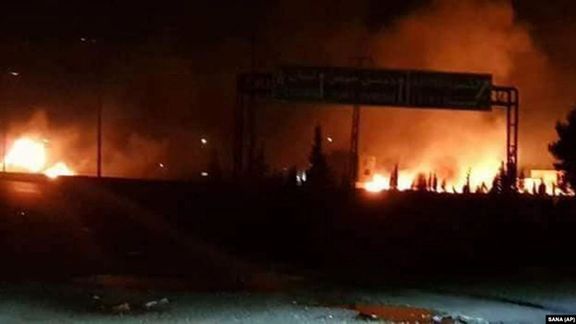
A Syrian airbase reportedly housing Iran-affiliated forces came under air attack just before midnight on Wednesday by what observers say were Israeli planes.
The official Syrian news agency SANA said one Syrian soldier was killed and three wounded in attack. The T4 airbase is located near the city of Palmyra.
The Syrian Observatory for Human Rights, a UK-based war monitor, said the airstrike hit targets controlled by Iranian forces, including the communication tower at the airport. The monitoring group said one Syrian soldier and three Iran-backed fighters were killed and seven others, among them three Syrian soldiers wounded.
It did not identify the nationality of the non-Syrian fighters.
Fars news agency in Iran, affiliated with the Revolutionary Guard (IRGC), reported the attack quoting the Syrian news agency without referring to any Iranian presence in the airport.
Since 2017, Israel has intensified air attacks against Iran-affiliated forces in Syria with hundreds of strikes so far. It rarely acknowledges the attacks but always maintains that it will not allow the Iranian military to entrench itself in Syria and pose a threat to Israel.
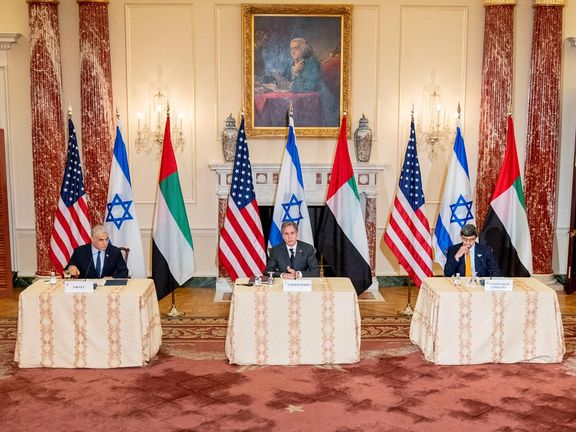
Today a split-screen emerged over Iran policy, as EU envoy Enrique Mora prepared to travel to Iran on Thursday in a bid to revive the stalemated nuclear talks.
US Secretary of State Antony Blinken, Israeli Foreign Minister Yair Lapid, and UAE’s Foreign Minister Sheikh Abdullah bin Zayed sent an ominous message that other options remained on the table if Tehran didn’t return to the Iran nuclear deal soon.
Iran left the Vienna talks with world powers in June as a new hardliner president, Ebrahim Raisi was elected, saying that it needed time to form a government. But more than two months after he took office, Tehran has still not specified a date for resuming the talks.
In a tweet, Mora wrote that he is “travelling to Tehran where I will meet with my counterpart at a critical point in time. As coordinator of the JCPOA (or Iran nuclear deal), I will raise the urgency to resume JCPOA negotiations in Vienna. Crucial to pick up talks from where we left last June to continue diplomatic work.”
E3 diplomats issued a slightly more aggressive statement, saying “the nuclear situation has worsened continuously and seriously. This therefore is from our E3 point of view not a ‘business as usual’ [visit] but a visit in [the] context of a deep crisis in the JCPOA.”
Meanwhile in Washington, Blinken alluded to Plan B planning underway at a joint press conference with his Israeli and Emirati counterparts.
He said, “we will look at every option to deal with the challenge posed by Iran.” “We are prepared to turn to other options if Iran doesn’t change course. Time is running short,” he added. “If the Iranians don't believe the world is serious about stopping them, they will race to the bomb. Israel reserves the right to act at any given moment in any given way,” Lapid warned.
US Special Envoy for Iran, Rob Malley also alluded to “other options” in an interview with the Carnegie Endowment for International Peace. However, he had a more mixed message as he said there has been too much focus on the issue of a date for the resumption of the nuclear talks.
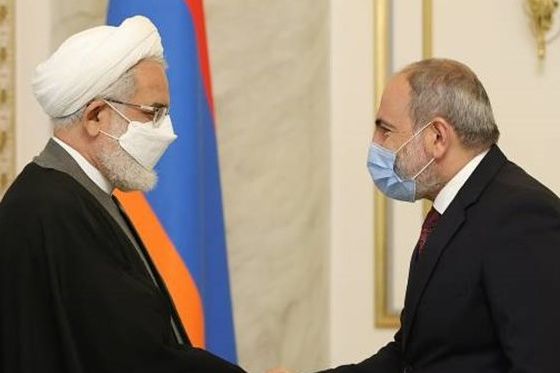
Baku freed two Iranian truck drivers whose arrest exacerbated tensions between the two neighbors that have simmered since last year’s Armenia-Azerbaijan war.
The move on Wednesday came a day after Iranian foreign minister Hossein Amir-Abdollahian spoke by phone with his Azerbaijani counterpart, Jeyhun Bayramov.
In a statement Wednesday, the Azeri foreign ministry said the two sides had agreed that recent " harmful rhetoric" did not reflect friendly bilateral relations. It stressed that disputes over transit roads should be discussed "directly by relevant government agencies," with the two ministers agreeing “the importance of alwaysrespecting the principles of territorial integrity and sovereignty.”
The Iranian foreign ministry reported Tuesday evening that Amir-Abdollahian had underlined that Tehran expected a resolution to the problem regarding transit routes. The ministry's website said Amir-Abdollahian had told his Azerbaijani counterpart that the two sides should not "allow enemies to disrupt" their mutual relations and that Bayramov had agreed to pursue the release of the truck drivers. The report said Amir-Abdollahian and Bayramov had agreed to visit each other.
Baku has restricted Iranian access to Armenia along roads it captured from Armenian forces last year, but Iran-Azerbaijan relations have been strained since the war, which deepened Tehran’s concern over the alleged presence of Israel and of jihadist militia recruited in Syria by Turkey close to Iran’s borders.
Since the arrest of Iranian truck drivers, officials and media in both countries have leveled harsh criticisms in strong language. Iran held extensive military drills near the border area after recent joint military drills between Turkey, Azerbaijan and Pakistan.
Iran’s Supreme Leader Ali Khamenei in a speech on 3 October warned about Israel's military presence in Azerbaijan and said regional countries should not allow foreign armies to interfere. He appeared to also accuse Turkey, an Azeri ally, of encouraging a standoff between Iran and Azerbaijan
Tehran is also seeking to bolster relations with Armenia, generally considered the loser in last year’s war. On three-day visit to Yerevan, Iran's Prosecutor-General Mohammad-Jafar Montazeri met Wednesday with Armenian Prime Minister Nikol Pashinyan, whose office in a statementsaid relations between Tehran and Yerevan were a "good base to resist all the challenges existing in the region.”
Iran's official news agency IRNA reported that Pashinyan had stressed the importance of implementing recent agreements reached with Iran's President Ebrahim Raisi (Raeesi) in Tashkent over renewing gas and electricity exchanges.
Some politicians and media in Iran have suggested a military pact with Armenia.
In a commentary headlined "Calm the turbulence north of Aras [River] with an Iranian military base" October 3, Javan newspaper strongly criticized Baku, for what it said was collaboration with Israel, and Ankara for alleged expansionist plans. The newspaper, which is affiliated to the Revolutionary Guards, suggested building an Iranian military base in Armenia's Syunik Province to guard against geopolitical changes.
"It appears that this would be a better way than continual military drills south of the Aras river," the commentary noted. The Aras divides Iran from Azerbaijan.